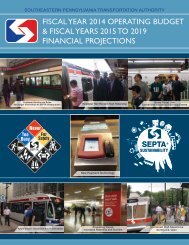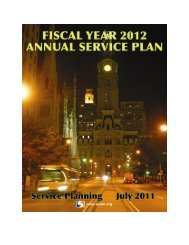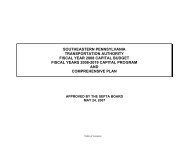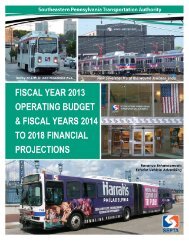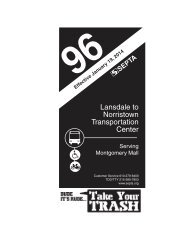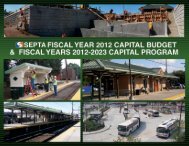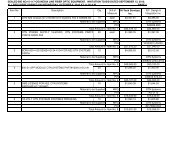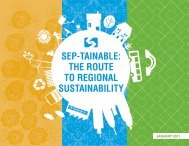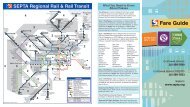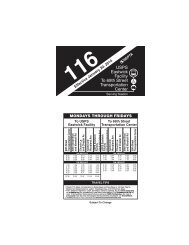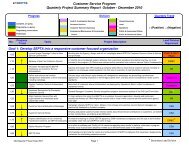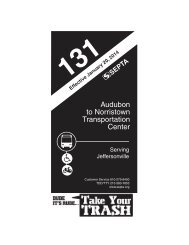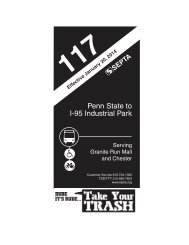FY 2012 Operating Budget and FY 2013-2017 Financial ... - Septa
FY 2012 Operating Budget and FY 2013-2017 Financial ... - Septa
FY 2012 Operating Budget and FY 2013-2017 Financial ... - Septa
Create successful ePaper yourself
Turn your PDF publications into a flip-book with our unique Google optimized e-Paper software.
Job Access <strong>and</strong> Reverse Commute Program<br />
The Job Access <strong>and</strong> Reverse Commute Program was initially authorized in the<br />
Transportation Equity Act for the 21st Century (TEA-21). This program is intended to<br />
establish a regional approach to job access challenges through the establishment of a<br />
Regional Job Access <strong>and</strong> Reverse Commute Transportation Plan. Projects derived from this<br />
plan support the implementation of a variety of transportation services that may be needed to<br />
connect welfare recipients to jobs <strong>and</strong> related employment activities. The program has two<br />
major goals: to provide transportation services in urban, suburban <strong>and</strong> rural areas to assist<br />
welfare recipients <strong>and</strong> low-income individuals in accessing employment opportunities during<br />
both traditional <strong>and</strong> non-traditional work hours, <strong>and</strong> to increase collaboration among the<br />
transportation providers, human service agencies, employers, metropolitan planning<br />
organizations (MPOs), states <strong>and</strong> affected communities <strong>and</strong> individuals. Job Access projects<br />
implement new transportation services, or extend existing services to fill the transportation<br />
gaps in areas between where welfare recipients <strong>and</strong> low-income persons live <strong>and</strong><br />
employment opportunities. Reverse Commute projects are designed to transport the general<br />
public from urban, suburban, <strong>and</strong> rural areas to suburban employment opportunities.<br />
Pursuant to federal Job Access <strong>and</strong> Reverse Commute Program requirements, the Delaware<br />
Valley Regional Planning Commission (DVRPC) adopted a revised regional Job Access <strong>and</strong><br />
Reverse Commute Transportation Plan, “Improving Access to Opportunities in the Delaware<br />
Valley Region” in January of 2007. The revised plan serves as a focal point for identifying<br />
potential projects to address the commuting needs of the region’s welfare recipients <strong>and</strong> lowincome<br />
individuals. Service providers include SEPTA, local transportation management<br />
associations, <strong>and</strong> non-profit organizations. Activities were selected to provide new or<br />
exp<strong>and</strong>ed bus, train, or van service to transport transitioning welfare recipients <strong>and</strong> lowincome<br />
individuals to employment centers in southeastern Pennsylvania.<br />
SEPTA Fiscal Year <strong>2012</strong> <strong>Operating</strong> <strong>Budget</strong> 143



